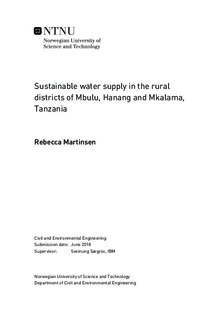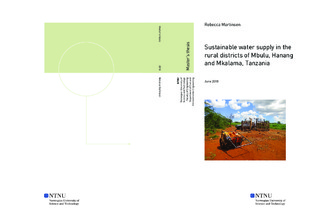| dc.description.abstract | The lack of sustainability in rural water supply remains a demanding challenge, even after several decades with attention on causes and solutions. Numerous measures have been implemented, but water supply schemes are still left unused due to wrong technology choices, insufficient support from the donors towards communities and lack of repair and maintenance. Solutions that have been implemented may quickly experience problems and it often takes too long before functionality is recovered. Especially hand pumps are often easily broken, which is a major problem with the enormous amount of installed hand pump in sub-Saharan Africa (SSA) during the last few decades. The users of the scheme will be forced to use their old and often contaminated sources of water during this downtime. A growing awareness of the need for institutional and financial support after the implementation of a scheme has arisen, but how this is to be managed must be evaluated in relation to the relevant context and conditions.
To investigate this problem further, a fieldtrip to Haydom, Tanzania, was conducted in the period January to March 2018. This part of Tanzania has a major rural population, which lives with water related stress. Several interviews with local villagers and examinations of their water schemes were conducted to get an understanding of the challenges they are facing. Most of the interviewed villagers depended on hand pumps for water, which requires regular maintenance and repair. Lack of sustainability has thus been a problem here, and hand pumps that previously have been installed are now out of use. Four Corners Cultural Program (4CCP), Norwegian Church Aid s (NCA) partner organization in the area, is working with the water related challenges.
One of the suggested measures to reduce the downtime is to install a remote monitoring system. Several aid organizations have explored the possibilities within this field, which inspired NCA to do the same. They developed a system that can log and transfer water flow data via mobile networks thereby enabling stakeholders to view the consumption and discover if the system is not working. The idea is that this will reduce the downtime of the non-functional pumps and hence increase sustainability of rural water projects. Their system was installed on two pumps; one solar powered motorized pump and one India Mark II hand pump. Multiple challenges were discovered during the implementation and the system is not yet functional. Time will show if they are able to make it work and contribute to the remaining sustainability challenge.
During the interviews with the inhabitants of the villages, and by observing the issues in real life, several other factors affecting sustainability became apparent. These fit well with factors identified in relevant literature. Institutional, financial, social, technical and environmental factors can all be observed in this setting and measures can be implemented on several of these. Having a more efficient and available supply chain of spare parts combined with more skilled and locally available mechanics equipped with tools can reduce downtime. A reduction of downtime can also be achieved by being more aware of the technology choices made, especially concerning the choice of water scheme and the supplier of it. Making people aware of the importance of a proper water scheme that delivers safe and clean water is also important as they more likely will take good care of it through well-managed operation and maintenance routines. This can be achieved through tariff settings and payment of water, or with enhanced focus on the health and society beneficial effects of an improved water source. Some of this is already common practice in 4CCP s work, but more can be done to further improve the sustainability of the projects. More work and effort has to be invested in identifying factors affecting sustainability in the relevant area and finding specific measures to reduce downtime. | |

